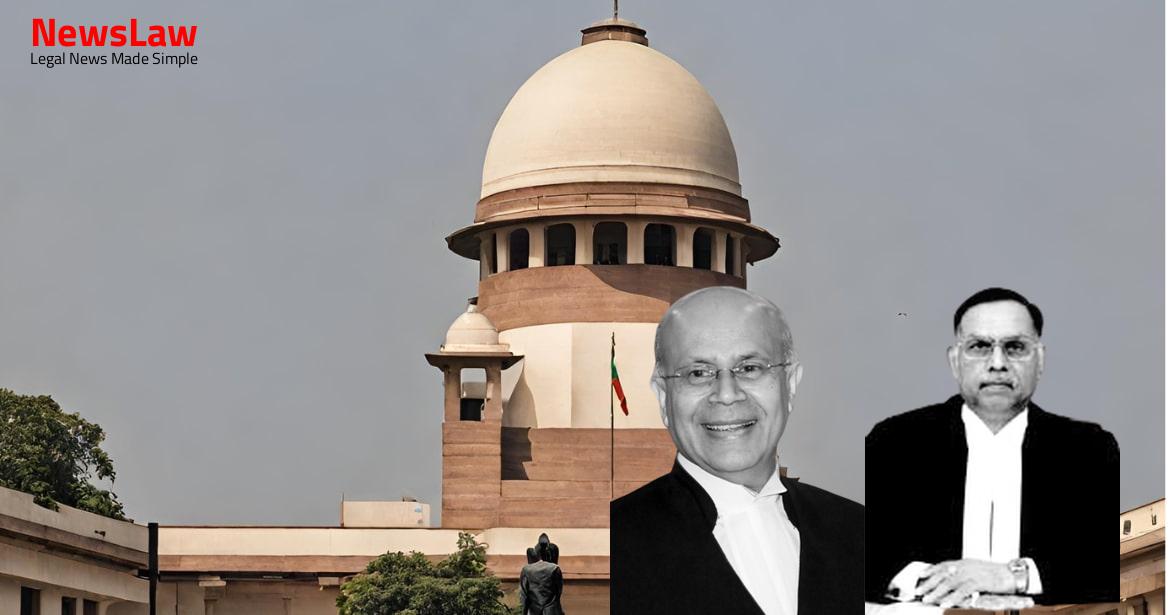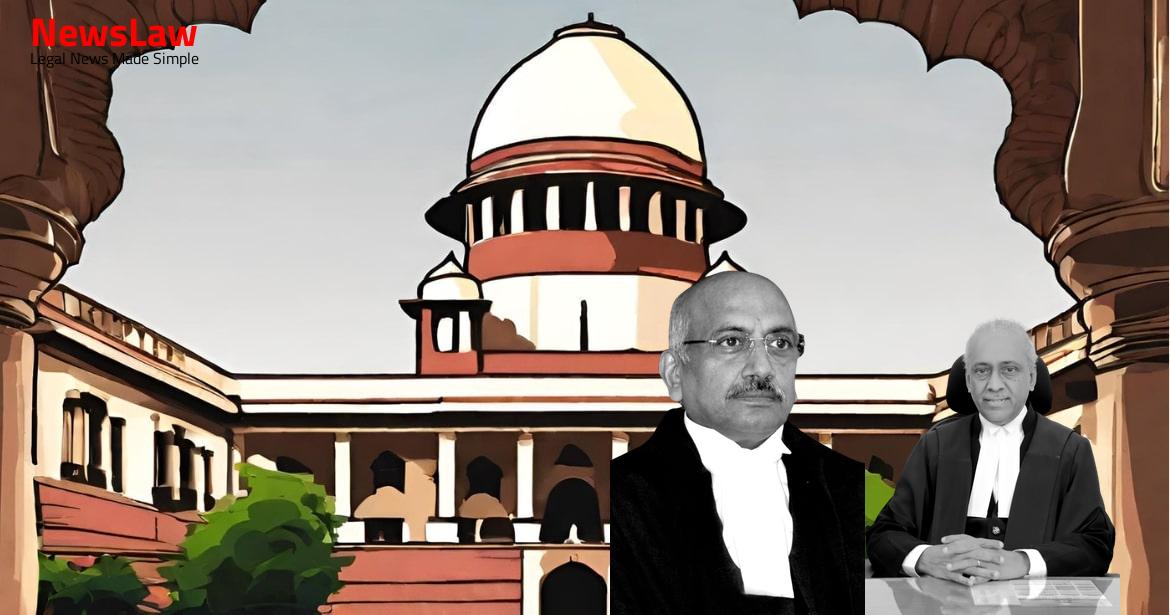In a significant legal ruling, the Supreme Court of India has delivered a judgement in the case involving the Appellant and Respondent concerning the non-furnishing of a crucial document. The case revolves around the failure to provide the document dated 20.01.2001, requested by the Appellant. This summary explores the implications of the court’s decision on the adjudication process and the parties involved.
Facts
- The appellant requested for dropping the proceedings and access to the letter dated 20.01.2001.
- CESTAT set aside the original orders and directed the respondent to provide the requested letter and decide the matter afresh.
- The appellant’s argument was that there was no evidence of clandestine removal, rendering the demand in the notice invalid.
- The company’s representative asked for more time and a copy of the letter but the Commissioner proceeded to pass orders on 28.02.2006.
- The appellant appealed in CMA No.469 and 470 of 2010 resulting in the tribunal’s order being set aside.
- Two miscellaneous petitions were filed for modification of the order, resulting in directions to adjudicate without relying on the letter dated 20.01.2001.
- First respondent adjudicated show cause notices afresh despite tribunal’s direction.
- Tribunal set aside the orders and directed the respondent to pass fresh orders after providing a copy of a specific letter.
- Respondent filed an application for rectification of the order, stating the letter was not available.
- Requested permission to adjudicate the show cause notices afresh without the said communication.
Also Read: Case Summary: Rabindranath Bose v. Union of India
Arguments
- Shri Shekhar Naphade, the Senior Counsel, argues that the final order dated 06.09.2006 by the tribunal had directed the respondent to provide a copy of a specific letter and its annexures, which was not complied with.
- The High Court, instead of allowing the appeal in full due to the non-compliance, remanded the matter back to the tribunal, which according to Shri Naphade was not the correct course of action.
- Shri Naphade asserts that the tribunal’s order of remand with specific directions should have been final and binding on the department, and any modification of that order was improper.
- He highlights that the appellant has been evading the adjudication process and that the letter dated 20.01.2001, requested by CESTAT in 2006, was crucial for the adjudication.
- Shri Naphade argues that without the detailed explanation contained in the document, the adjudicating authority cannot properly assess and decide on the Show Cause Notices (SCNs), making the remand to the tribunal erroneous.
- He concludes by requesting the setting aside of the High Court’s order and the allowance of the appeals.
- The respondent supports the impugned order and requests for the dismissal of the appeals.
- It is argued that unless the appellant can prove prejudice due to the non-furnishing of the document, the plea of non-furnishing of the document should not be considered.
- The respondent contends that without establishing any harm from the absence of the document, the appellant cannot claim not being able to reply to the show cause notice.
Also Read: Bail Application Rejected: Analysis of UAP Act Bail Provision
Analysis
- The letter dated 20.01.2001 was not available with the Revenue but was acknowledged by the appellant.
- The Commissioner discussed the contents of the letter in the show cause notices themselves.
- Merely referring to a document in a show cause notice does not imply reliance on it unless explicitly stated.
- The appellant repeatedly requested copies of the letter dated 20.01.2001, indicating their awareness of its contents.
- The High Court clarified that the letter was not used adversely against the appellant by the Revenue.
- Non-furnishing of a document not causing prejudice to the appellant if it originated from them and was not used for adverse inference.
- The Tribunal’s direction for the provision of the document was not adhered to by the adjudicating authority.
- The communication from the appellant requesting the document showed their understanding and need for its content.
- Denial of natural justice was apparent in the proceedings due to failure to provide the document.
- The direction issued by the tribunal was not fully complied with by the subsequent authorities.
- The High Court did not remit the matter to the adjudicating authority for reconsideration.
- Findings of the High Court mentioned in paragraphs 19 and 20 were affirmed.
- The appellant is allowed to present all contentions before the tribunal, including demonstrating prejudice due to non-furnishing of a specific letter dated 20.01.2001.
- Both parties are given the opportunity to argue their contentions before the tribunal.
- The order of remand to the tribunal by the High Court is affirmed with the above observations.
- The appeals are disposed of, and no costs are awarded.
- The order of review or modification dated 08.03.2010 is deemed to lack legal sanctity and is accepted based on findings in paragraphs 25 to 29 of the impugned order.
Also Read: Analysis of Circumstantial Evidence in Murder Case
Decision
- Impugned orders set aside and appeals allowed by way of remand
- Directions issued to Commissioner to provide appellants with necessary documents, allow perusal of records, grant reasonable opportunity for personal hearing, and pass speaking orders within 8 weeks from date of hearing
- Requirement for party to cooperate with Commissioner’s proceedings and appear for hearing
Case Title: M/S MADURA COATS PRIVATE LIMITED Vs. COMMISSIONER OF CENTRAL EXCISE (2024 INSC 336)
Case Number: C.A. No.-005347-005348 / 2024



